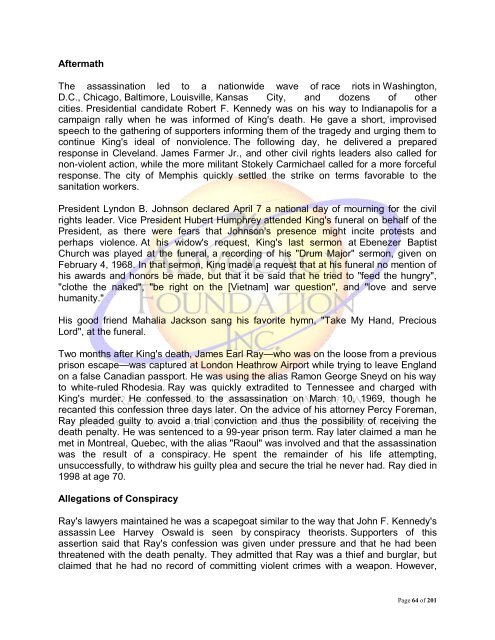You also want an ePaper? Increase the reach of your titles
YUMPU automatically turns print PDFs into web optimized ePapers that Google loves.
Aftermath<br />
<strong>The</strong> assassination led to a nationwide wave <strong>of</strong> race riots in Washington,<br />
D.C., Chicago, Baltimore, Louisville, Kansas City, and dozens <strong>of</strong> other<br />
cities. Presidential candidate Robert F. Kennedy was on his way to Indianapolis for a<br />
campaign rally when he was informed <strong>of</strong> King's death. He gave a short, improvised<br />
speech to the gathering <strong>of</strong> supporters informing them <strong>of</strong> the tragedy and urging them to<br />
continue King's ideal <strong>of</strong> nonviolence. <strong>The</strong> following day, he delivered a prepared<br />
response in Cleveland. James Farmer Jr., and other civil rights leaders also called for<br />
non-violent action, while the more militant Stokely Carmichael called for a more forceful<br />
response. <strong>The</strong> city <strong>of</strong> Memphis quickly settled the strike on terms favorable to the<br />
sanitation workers.<br />
President Lyndon B. Johnson declared April 7 a national day <strong>of</strong> mourning for the civil<br />
rights leader. Vice President Hubert Humphrey attended King's funeral on behalf <strong>of</strong> the<br />
President, as there were fears that Johnson's presence might incite protests and<br />
perhaps violence. At his widow's request, King's last sermon at Ebenezer Baptist<br />
Church was played at the funeral, a recording <strong>of</strong> his "Drum Major" sermon, given on<br />
February 4, 1968. In that sermon, King made a request that at his funeral no mention <strong>of</strong><br />
his awards and honors be made, but that it be said that he tried to "feed the hungry",<br />
"clothe the naked", "be right on the [Vietnam] war question", and "love and serve<br />
humanity."<br />
His good friend Mahalia Jackson sang his favorite hymn, "Take My Hand, Precious<br />
Lord", at the funeral.<br />
Two months after King's death, James Earl Ray—who was on the loose from a previous<br />
prison escape—was captured at London Heathrow Airport while trying to leave England<br />
on a false Canadian passport. He was using the alias Ramon George Sneyd on his way<br />
to white-ruled Rhodesia. Ray was quickly extradited to Tennessee and charged with<br />
King's murder. He confessed to the assassination on March 10, 1969, though he<br />
recanted this confession three days later. On the advice <strong>of</strong> his attorney Percy Foreman,<br />
Ray pleaded guilty to avoid a trial conviction and thus the possibility <strong>of</strong> receiving the<br />
death penalty. He was sentenced to a 99-year prison term. Ray later claimed a man he<br />
met in Montreal, Quebec, with the alias "Raoul" was involved and that the assassination<br />
was the result <strong>of</strong> a conspiracy. He spent the remainder <strong>of</strong> his life attempting,<br />
unsuccessfully, to withdraw his guilty plea and secure the trial he never had. Ray died in<br />
1998 at age 70.<br />
Allegations <strong>of</strong> Conspiracy<br />
Ray's lawyers maintained he was a scapegoat similar to the way that John F. Kennedy's<br />
assassin Lee Harvey Oswald is seen by conspiracy theorists. Supporters <strong>of</strong> this<br />
assertion said that Ray's confession was given under pressure and that he had been<br />
threatened with the death penalty. <strong>The</strong>y admitted that Ray was a thief and burglar, but<br />
claimed that he had no record <strong>of</strong> committing violent crimes with a weapon. However,<br />
Page 64 <strong>of</strong> 201

















